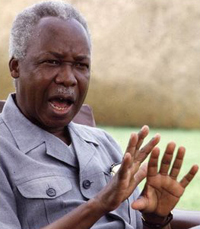Nyerere: Tanzania's Problems are Managable

Born in Butiama village near Musoma (on the shores of Lake Victoria) in 1922, Julius K. Nyerere (christened Mwalimu) was the father of the Tanzanian nation. he led the nation in the struggle against colonialism as well as against post-colonial challenges. Nyerere's main philosophy was African socialism. It was in line with this philosophy that the Arusha Declaration (1967) was inaugurated. Nyerere gave his support to the African liberation movements against colonialism in South Africa, Zimbabwe, Mozambique and Angola among others. He succumbed to leukaemia at St. Thomas Hospital in London on October 14, 1999 and was laid to rest at his home village. Below is his independence speech on 9th December 1961.

Mwalimu Julius Nyerere
“I have listened to your Royal Highness’ expressions of goodwill and to those which you have brought to us from Her Majesty; and I have received these Instruments which are the embodiment of my country’s freedom with the deepest emotion. This is the day, for which we have looked so long, the day when every Tanganyikan can say, ‘I am a citizen of a sovereign independent state.’
“Joyful though this moment is, you, sir, have rightly reminded us that it is a moment heavy with responsibility. This our people will appreciate. Our responsibilities towards our own people will, in all conscience, be difficult enough to discharge. In a country such as ours, the struggle to raise the standards of our people and to lift up our economy will be but severe. It will be waged with all the confidence and resolve that inspire this new nation.
“In addition, we have wider duties than those we bear towards ourselves alone. We have our responsibilities towards all those other African states with which our links are bound to be so close; and further, even the newest of nations has in these days duties towards all the nations upon earth and opportunities to influence, by example, the policies even of the most powerful.
“Nevertheless today is our day of rejoicing. And so I will say no more of the many problems that face us, both in Tanganyika and in the larger world outside, than to remind our people that they exist, and that together we must grapple with them.
“Let me now pay tribute to all who have helped us forward to this happy day of the culmination of our hopes. First, to the people of Tanganyika on whose faithful support and steady good sense Tanganyika’s political advance has rested. And then to those many true friends of Tanganyika, at home and overseas, the British officers in the service of the Government, the men of religion working for the missions, the planters and men of commerce who founded our economy, private individuals, all that great host of people who by faith and toil and steadfast devotion to their duty have nobly helped to bring this day about. Some I would like to mark by name, but this is no time to pick out individuals. Those who are no longer with us, those who still remain, I salute them all.
“To Your Royal Highness I must express our grateful thanks for your presence here amongst us; and to Her Majesty for sending her husband to be with us on this great occasion.
“May God guide us all, so that our country goes forward happiness and prosperity and in fellowship with the nations of the world.”
Question of the week: "In a country such as ours, the struggle to raise the standards of our people and to lift up our economy will be but severe." What challenges is Tanzania facing in her attempt to raise the living standards of its people and the nation's economy.
